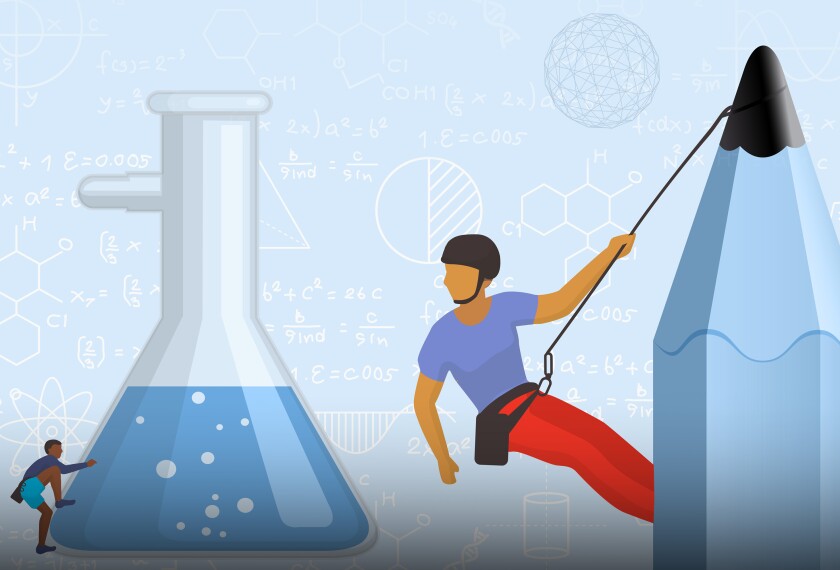Editor’s Note: This is part of a continuing series on the practical takeaways from research.
Over the past year, students have had to learn a lot about a phenomenon that has dominated their lives: the COVID-19 pandemic. Making sense of it has required families to learn together about the science of the virus and figure out how to protect their health in the face of great uncertainty and social inequality.
As education seeks to rebuild coming out of the COVID-19 era, teaching science through the lens of phenomena presents an opportunity to make the subject more meaningful to students. The recently enacted American Rescue Plan provides funding for states, districts, and schools to address disruptions in student learning caused by the pandemic. Some of that money could go to getting teachers the experiences and students the materials that make quality phenomenon-based science education possible.
“Phenomena” refer to observable events in the world that require science knowledge and practices to explain, such as the causes and course of the. Organizing instruction around phenomena is a key feature of many reforms aimed at meeting the Next Generation Science Standards, an ambitious set of standards adopted or adapted by 44 states in 2013. Phenomena are also an organizing feature of instructional reforms in countries outside the United States, likehigh-performing . But what is phenomenon-based learning, and what evidence is there that it works?
In the past, science teaching often introduced students to new topics using a demonstration or by presenting a surprising finding or event. In phenomenon-based learning, units of instruction are organized around the task of explaining a complex phenomenon or meeting a design challenge. That is, phenomena and problems provide the primary context for students to ask questions, conduct investigations, build models, argue from evidence, and communicate findings. Phenomena are more than just the initial “hooks” that are intended to capture interest. They are what motivates students to develop their understanding of science ideas and what
I was a co-author of a study that compared the with that of a more traditional approach. We randomly assigned schools to either the “treatment,” where teachers implemented the phenomenon-based curriculum, or the comparison condition, where teachers followed the district-adopted textbook.
In phenomenon-based learning, units of instruction are organized around the task of explaining a complex phenomenon or meeting a design challenge.
The textbook presented science much as many do, primarily as a body of facts and vocabulary to be learned with few opportunities to engage with phenomena. By contrast, the phenomenon-based curriculum organized units around explaining such occurrences as the “Ring of Fire” across the Pacific Ocean, where active volcanoes and earthquakes are much more common than elsewhere.
Our study found that students exposed to the phenomenon-based curriculum learned more based on a test aligned with the Next Generation standards than did students using the textbook. Importantly, the results were similar across students of different racial and ethnic backgrounds.
Just this spring, results from two additional random-assignment studies—considered the gold standard for evaluation—found that students learned more in phenomenon-based courses than in courses organized more traditionally. In one , students exposed to the curriculum organized around meaningful projects where they have to explain phenomena outperformed students exposed to a traditional AP course organized around topics on the AP test. A examined the impact of a project-based science curriculum for elementary-aged students that also integrated supports for social and emotional learning. That study found students following the project-based curriculum outperformed those in the control group on a test designed by the Michigan education department aligned to the Next Generation standards.
While studies of materials for phenomenon-based learning are still few in number, a rich literature on problem-based science learning suggests how students and schools are likely to fare with a phenomenon-based approach. Phenomenon-based learning is in fact just a particular kind of problem-based learning, that is, learning where the development of science understanding is motivated by an attempt to solve real-world problems. A of 82 high-quality studies documented positive impacts of problem-based learning on student outcomes, such as conceptual knowledge, problem-solving skills, and self-regulation skills.
Phenomenon-based or problem-based learning is not without its challenges. One is helping students make generalizations from specific cases. When learning is organized around explaining, students may not develop knowledge of the general principles or big science ideas that they could apply to other situations. A successful strategy can be to structure opportunities for students to encounter and make sense of or of phenomena related to similar science ideas.
In addition, to be successful, phenomena must be compelling enough to sustain students’ attention through the course of a unit. Teachers play a significant role in that by helping students make connections between phenomena presented in curricula and students’ interests, identities, and lived experiences. The research-practice partnership I’m a part of, , , too, between students’ engagement and their understanding of how a particular lesson fits into a broader sequence of lessons.
The past year has proved the critical role science education plays in our society. Phenomenon-based teaching has the potential to promote deep and meaningful science learning in our schools. As states and districts consider priorities for educational recovery and renewal, for my money there’s no better use of money in science education than moving to approaches that are phenomenon-based.





